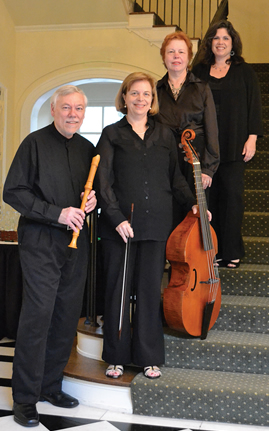This preview has been provided by Carolina Pro Musica
Frederick II, known as Frederick the Great ascended the throne in 1740. His upbringing had included a stern father who did not wish his son to have interests in the ‘folly of the laity’ including art and music. However, his mother Sophia Dorothea of Hanover, sister of George II of England, aided in developing the musical talents of both the crown prince and his sister. Frederick at age 16 began to study flute with J.J. Quantz. He had some musicians in his employment around 1738. The situation changed dramatically when he became King. He increased his musicians to about 50. These included C.P.E. Bach, his first keyboardist, Karl Heinrich Graun, Kapellmeister, Franz and Joseph Benda as violinists, J.S. Quantz as chamber musician and flutist. Many of these were not only the finest performers of their day but composers in their own right. Many, like C.P.E. Bach, remained in the court for years and wrote some of their most important works during this time.
Among Frederick’s first actions as king was to commission his court architect Georg von Knobelsdorf to build a great new theater. Knobelsdorf would also design the summer palace Sanssoucci in Potsdam. During the first fifteen years of Frederick’s reign he gave opera the same intense attention that he gave to playing the flute, building up his army, and leading it in the field. He supervised the engagement of singers, the preparation of librettos (in several cases preparing a draft of the libretto himself in French, which his theater poet used as the basis for an Italian libretto), rehearsals, scenery and costumes. “The king,” wrote Dr. Charles Burney, “always stands behind the maestro di capella, in sight of the score, which he frequently looks at, and indeed performs the part of the director-general here, as much as of generalissimo in field.”
Carolina Pro Musica’s September 27th concert features music from the time of Frederick. C.P.E. Bach, born in 1714, is celebrating his 300th birthday this year. We include a musical tribute to this often overlooked composer including an excerpt from his “Magnificat” composed in Berlin. Featured will be a flute sonata, one of many composed by Frederick, and an aria from the opera Montezuma (1755) for which Frederick wrote the libretto and Graun the music. A trio sonata by Quantz for flute and recorder adds another dimension as does an aria from La Clemenza di Tito by Hasse which was performed in 1742 in the inaugural year of the new opera theater in Berlin.
We know Frederick practiced the flute and wrote music daily. Evenings were occupied by a concert of the best music of the period. Join Carolina Pro Musica for a musical excursion from Berlin to Potsdam.
This program will be repeated October 6, 2014 at Belmont Abbey College, Belmont, NC.











